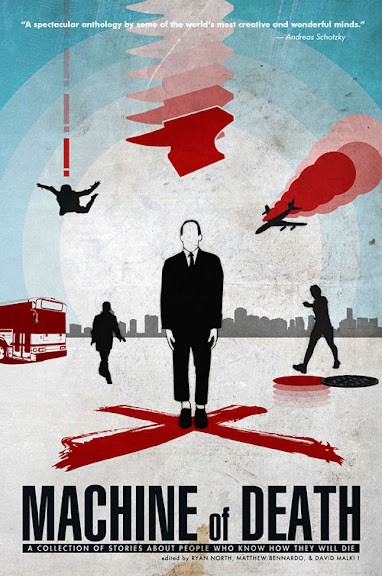
This podcast interview by Jesse Brown with the creator of Dinosaur Comics and this web interview about the brief but dazzling success of a short story collection, ‘Machine of Death are interesting at a number of levels.
Briefly, a group of well-known web comic creators got together and found contributors from among their readers for this short story collection that they would then illustrate. No mainstream publisher would touch it because it didn’t contain material from authors they recognised, so they thought they would self-publish it. And they organized the fan base they had gathered from their web comic activity to buy the book all at once in order to get media attention. It worked and the book hit number 1 for several hours on Amazon US (though as they said it only took “thousands” of sales to do this – it’s now at #1192). A few days later, they released the full text of the book free as a downloadable PDF.
This phenomenon has naturally excited a number of the proponents of “new authorship” models and it is indeed an impressive achievement, but I would add a few cautionary notes to this tale:
Ryan North says he is able to make a ‘comfortable living’ from t-shirt sales driven by his free online comic strip but wouldn’t say how much this amounted to (and his standards of ‘comfortable’ may have been formed by his recent status as an impecunious grad student).
It benefited from promotion by the fan bases of several well-known web comics authors, was promoted on a number of very prominent sites like boingboing, and falls into the sci-fi/fantasy genre. It may even be a great read (I don’t know yet but I have started downloading the podcast). Taken together this constitutes a nearly ‘perfect storm’ in favour of this book.
The broader question for the future of this model has to be how replicable it is. At the moment this is newsworthy – the economic significance of online-driven publication will be proven when tens of thousands instead of (I’m guessing) a few hundred authors can earn enough in this way to afford to bypass the conventional publishing system.
Of course none of this should take away from the fact that even if this is not the start of an economic revolution for new authors it may well be the start of a cultural revolution enabling many more people to become published authors (even if with a rather different notion of what being ‘published’ means). It is this as much as anything else I intend to explore in my upcoming research.
